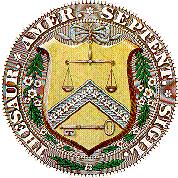| Robert F. Mulligan, Ph.D.
WESTERN CAROLINA UNIVERSITY COLLEGE OF BUSINESS Department of Economics, Finance, & International Business |
 |
| Robert F. Mulligan, Ph.D.
WESTERN CAROLINA UNIVERSITY COLLEGE OF BUSINESS Department of Economics, Finance, & International Business |
 |
|
|
| Gresham's law is the general principle that in a market economy no commodity is ever allocated to a purpose for which it is known that a cheaper commodity would serve as well. Applied to money, Gresham's law states that when a government attempts to make two different kinds of money, unequal in value, circulate together as if they were equal in value, people will hoard the more valuable money and only use the cheaper money. Or in other words, bad money drives out good. |
| Gresham's law was given its name by the British economist Henry D. McLeod (1821-1902), who attributed it to Sir Thomas Gresham (1519-1579). Sir Thomas was a very successful merchant who advised Elizabeth I (1533-1603) on commercial affairs. He advised the queen that her father Henry VIII (1491-1547), by debasing the coinage, had caused a drop in the foreign exchange value of English money, and driven all the fine gold out of England. At his death he endowed Gresham College, which was incorporated into the University of London. |
| Nicholas Copernicus (1473-1543) wrote, in his De Monetae Cudendae (On the Striking of Money), "that it is impossible for good-weighted coin and base and degraded coin to circulate together, that all the good coin is hoarded, melted down, or exported, and the degraded coin alone remains in circulation." Copernicus was an astronomer and minor official of the Church, a Doctor of Canon and Civil Jurisprudence, best known for De Revolutionibus Orbium Coelestium (On the Revolutions of the Heavenly Spheres) (1543) which argued that the earth moves around the sun. |
| Nicole Oresme (1320?-1382) Bishop of Lisieux, argued against the debasing of coins on moral grounds in his undated Tractatus de Origine, Natura et Mutationibus Monetarium (Treatise on the Origin, Nature, and Changes of Money). He was at least partly aware of Gresham's law and correctly described some of its consequences. He was a cardinal and papal legate as well as an important commentator on Aristotle. He also wrote Le Livre du Ciel et du Monde (The Book of the Heavens and the Earth) . |
| The oldest known statement of Gresham's law is by the Athenian playwright Aristophanes (448?-380?B.C.) in The Frogs (405 B.C.). "The course our city runs is the same towards men and money. She has true and worthy sons. She has fine new gold and ancient silver, coins untouched with alloys, gold or silver, each well minted, tested each and ringing clear. Yet we never use them! Others pass from hand to hand, sorry brass just struck last week and branded with a wretched brand. So with men we know for upright, blameless lives and noble names. These we spurn for men of brass...." The Frogs only mentions this in passing, and Aristophanes uses it to make a point about the fickleness of Athenian democracy and public opinion. He implies the people often choose inferior leaders. This play is well known for the famous (verbal) duel between the playwrights Aeschylus and Euripides, and such lines as, "what is shame, that the theater deems no shame?" and "who knoweth if to live be but to die, if breath is bread, and sleep a wooley lie?" |